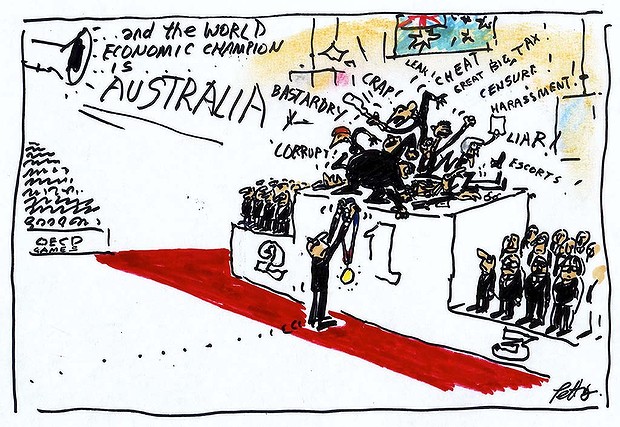Search
Democracy Links
Member's Off-site Blogs
in a world of outrageous fortune .....

One of the curses of being an unpopular prime minister, leading an unpopular government, is that almost every event comes to be seen through the prism of leadership and to impact on the party's electoral fortunes. At just the same time, bad news creates its own momentum, and it comes to seem almost impossible to generate news and dominate the media agenda with stories placing the leadership and the government in a favourable light. The last few weeks might serve as a good example. Before Parliament resumed, Julia Gillard moved to deal with two problems she had finally come to recognise as matters dragging down the reputation of the government - allegations against the Speaker, Peter Slipper, and Member for Dobell, Craig Thomson. Her actions failed to clear the air, the more so because she seemed unable to get right her lines on why her action had been so belated, and what ''clear line'' she now felt the politicians had crossed.
Just as damaging was the fact that the stories limited the capacity of the budget to generate positive publicity for the government, negative publicity for the opposition, or even to dominate the news cycle for more than a few days. Instead, Parliament was arguing issues of sleaze, the proper and responsible actions when serious allegations are made, and long recitals, and long denials, of facts alleged in a quasi-judicial investigation into a union's affairs.
The very exploitation of the issues by the Leader of the Opposition, Tony Abbott, has been designed to reinforce a message that there is now something illegitimate about this minority's government's carrying on, because, it is said, some of the votes supporting it are tainted. This is, of course, constitutional nonsense, coming particularly ill from a party with a history, over the past 40 years, of making far more improper use of tainted votes. But the suggestion, nevertheless, has some resonance, not least among those who strongly suspect that Mr Thomson is guilty of what is alleged, and who believe that, if he is, he is not fit to represent Labor in Parliament.
To compound her problems, Ms Gillard returned to Australia last week after a successful but low-key trip abroad to discuss the crisis in Europe and our future in Afghanistan, to discover that a number of her ministers had arranged between themselves, and announced, a decision to allow the entry of up to 1700 foreign workers to work at Gina Rinehart's iron ore mine. The matter did not, apparently go through cabinet, nor was its sensitivity flagged with any number of senior ministers who would have instantly recognised it as an issue. That sensitivity is not merely about the fact that Ms Rinehart, the world's richest woman, is a favoured hate object of the Treasurer, Wayne Swan, and one of an axis of the very rich used by him in partisan warfare, particularly about taxes and influence on government. These might have sounded bells, but the sensitivity of the decision was not about an opportunity to discriminate against Ms Rinehart or to treat a business case mounted by her companies in any manner different from a case by anyone else. Much more important, and worth wide government consideration, was the question of enterprise-level foreign worker entry, particularly on the scale involved here. Ms Gillard, apparently, quickly saw the danger and tried some early damage control; but neither she, nor the government, has avoided heavy criticism, particularly from unions anxious about implementation of the decision will affect their bargaining positions.
It was hardly surprising that some of Ms Gillard's enemies immediately saw this as yet another example of her poor leadership, and of the despair most feel about Labor's prospects under her. By weekend's end, the major open critic seemed to have recanted, with Ms Gillard pretending, in effect, that the dismay had not occurred, and that the rumbling, and the concern, was non-existent. On her side of the story is that her critics, increasing in number, do not have a champion ready to take over, and that her last challenger, Kevin Rudd, is said to be very reluctant to have another go, not least because of the bruising of last time. That may be on Ms Gillard's side, but what is clear is that she badly needs to reorganise her personal office to improve her political antenna, and to develop some strategy and tactics for getting in control of affairs. That's not, as some of those on the sidelines seem to suggest, a matter of better public relations or spin. But it is about getting the politics right, doing that involves getting judgment right, timing right and proportions right. While Ms Gillard is on the back foot, ever defending previous bad judgments, the government of Australia is suffering. It is no coincidence that the fortunes of the PM and the ALP suffer as well.
- By John Richardson at 28 May 2012 - 1:34pm
- John Richardson's blog
- Login or register to post comments
Recent comments
3 hours 1 min ago
6 hours 40 min ago
8 hours 39 min ago
9 hours 1 min ago
9 hours 33 min ago
9 hours 43 min ago
17 hours 57 min ago
20 hours 47 min ago
21 hours 8 min ago
23 hours 43 min ago